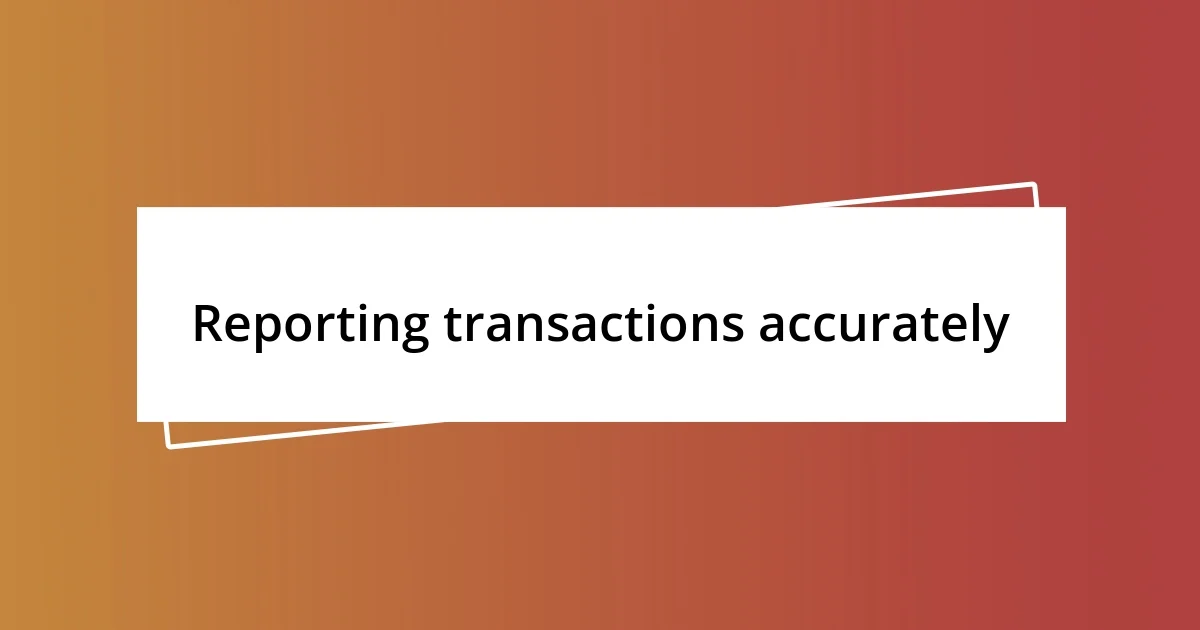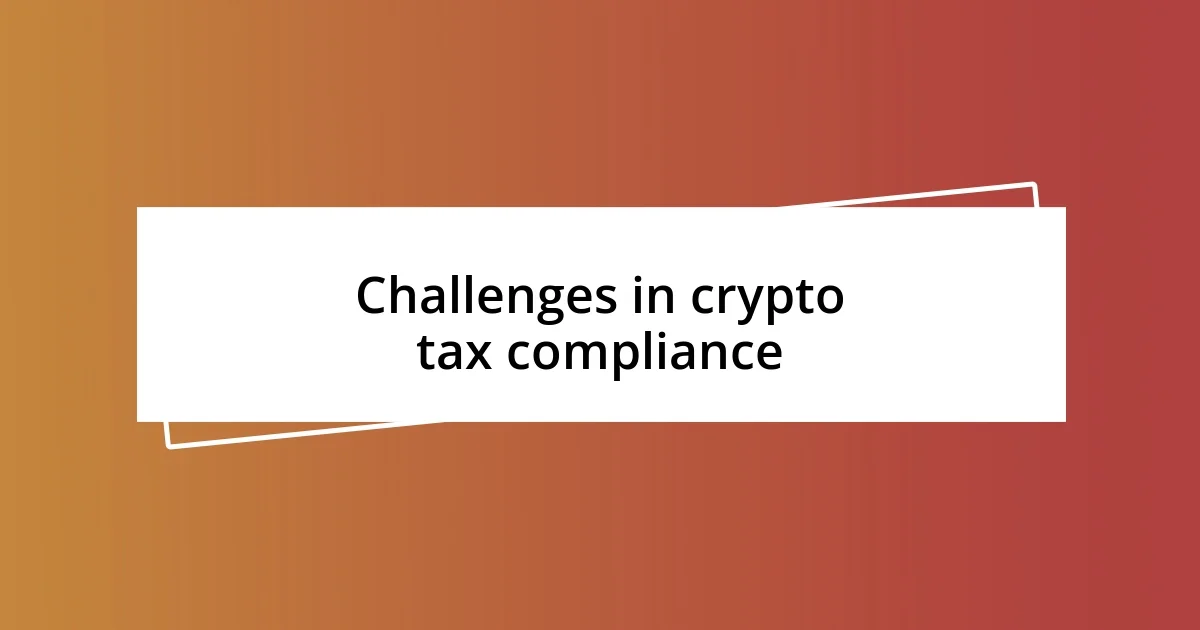Key takeaways:
- Cryptocurrencies are classified as property by the IRS, leading to potential taxable events like trades, transfers, and airdrops.
- Different types of crypto taxes include capital gains tax on profits, income tax on received crypto, and gift/inheritance tax implications.
- Accurate transaction reporting is essential; utilizing tracking software, keeping detailed records, and understanding deductions/credits can simplify tax obligations.

Understanding crypto tax obligations
When it comes to crypto tax obligations, understanding the nuances can feel overwhelming. I remember when I first ventured into the world of cryptocurrency and realized that every trade, transfer, and even airdrop could potentially have tax implications. It made me question: am I really prepared to keep track of everything?
You see, the IRS considers cryptocurrencies as property, which means that transactions can indeed trigger taxable events. I’ve often found myself scribbling down all my trades and conversions in a journal, fearing the consequences of not reporting accurately. It’s crucial to adopt a meticulous approach; otherwise, you might end up with a huge tax bill that you weren’t expecting.
For many, it’s easy to overlook the various types of taxable events in crypto, such as exchanging one crypto for another or using it to purchase goods and services. Reflecting on my own experience, I’ve learned the hard way that staying informed and organized pays off. Have you ever faced the frustration of trying to track down past transactions? I have, and it taught me how essential it is to maintain clear records from the get-go.

Different types of crypto taxes
When diving into the world of cryptocurrencies, it’s fascinating to uncover the various types of taxes that apply. For instance, capital gains tax is one of the most common, charged on profits made from selling or trading your crypto. I recall the thrill of making a profit on my first trade only to realize later that I owed taxes on the gains; it was a bittersweet lesson that transformed my approach to trading.
Another notable type is the income tax, which comes into play when you receive cryptocurrency as payment or from activities like mining. I remember when I received Bitcoin as a reward for my mining efforts. It was a moment of excitement, but I quickly learned that the joy could be offset by the tax burden I had to report when I converted it to fiat currency.
Lastly, there are specific considerations for crypto gifts and inheritances. Whenever I think about gifting crypto, I ponder not just the value but also the tax implications, as they can vary significantly depending on how long the gift has been held. It’s a unique landscape that demands awareness and planning.
| Type of Tax | Description |
|---|---|
| Capital Gains Tax | Tax on profits from selling or trading cryptocurrency. |
| Income Tax | Tax on cryptocurrency received as payment or from mining. |
| Gift and Inheritance Tax | Potential tax implications for transferring crypto assets as gifts or inheritances. |

Reporting transactions accurately
Keeping track of transactions accurately is vital for any crypto enthusiast. I can’t stress enough how easy it is to lose track of trades or mistakenly report a non-taxable transaction as taxable. In one instance, I realized I had failed to include a small trade from a few months back, and it sent me into a panic. I learned that even the smallest transactions can add up, leading to potential penalties if not reported correctly. That’s when I decided to invest in a reliable tracking software – it has made my life so much easier.
Here are some tips that I’ve picked up along the way for accurate reporting:
- Document Every Transaction: Always keep a detailed record of every buy, sell, and exchange, including dates and amounts.
- Use Tracking Software: Consider using tools designed for crypto to automatically aggregate and classify your transactions.
- Review Blockchain Records: Familiarize yourself with your wallet’s blockchain history; it’s a great way to cross-check your manual records.
- Consult Tax Professionals: When in doubt, don’t hesitate to seek professional advice to ensure all aspects of your transactions are covered.
- Stay Organized: Create a dedicated folder, digital or physical, for all relevant documents related to your crypto activity.
By doing these things, I’ve transformed the way I view my crypto investments, turning what once felt like chaos into a manageable system.

Deductions and credits for taxpayers
When navigating the realm of crypto taxes, it’s surprising to discover how deductions and credits can sometimes alleviate the financial burden. I recall a year when my losses exceeded my gains, and I didn’t realize I could offset some of that taxable income through deductions. It felt like finding a hidden treasure that helped restore some peace of mind amidst the chaos.
Additionally, there’s the potential for credits that might apply depending on your specific situation. For example, some individuals can qualify for credits through charitable donations of crypto. I remember the moment I donated a small amount of Bitcoin to my favorite charity – not only did I feel good about giving back, but I also enjoyed the nice little tax credit that came with it. It was a win-win that encouraged me to think more about how my investments could support causes I care about.
While every taxpayer’s situation is unique, understanding these opportunities is crucial. Have you ever considered how your crypto losses could work for you come tax season? I did, and it transformed my entire approach to managing gains and losses in my portfolio, making the tax implications a little less daunting.

Challenges in crypto tax compliance
Navigating the complexities of crypto tax compliance can often feel overwhelming. One major challenge is the constantly changing regulations. I remember attending a seminar and hearing about new rules announced just days after I thought I had a solid understanding. It made me realize how quickly things can shift in the crypto landscape, leaving us scrambling to ensure we’re compliant with the latest guidelines. Have you ever felt that dread when realizing a tax law has changed right before a deadline?
Another significant hurdle is the lack of universally accepted reporting standards for cryptocurrencies. Each exchange has its protocols, and I recall struggling to consolidate records from various platforms. Sometimes transactions look different based on the source, which leads to confusion and potential inaccuracies. I learned the hard way that even seemingly straightforward crypto trades can involve intricate details that affect reporting. Have you ever faced discrepancies between exchanges that left you questioning what to report?
Moreover, the classification of crypto transactions can complicate compliance. Are you aware that not all trades are treated equally for tax purposes? I found myself exploring whether certain token swaps counted as trades or if they fell under different categories altogether. Understanding these distinctions is crucial, and I often reflect on how important it is to stay educated on the specific nuances that can impact my tax obligations. It’s not just about following the rules—it’s about understanding how they apply to each of our unique situations.














